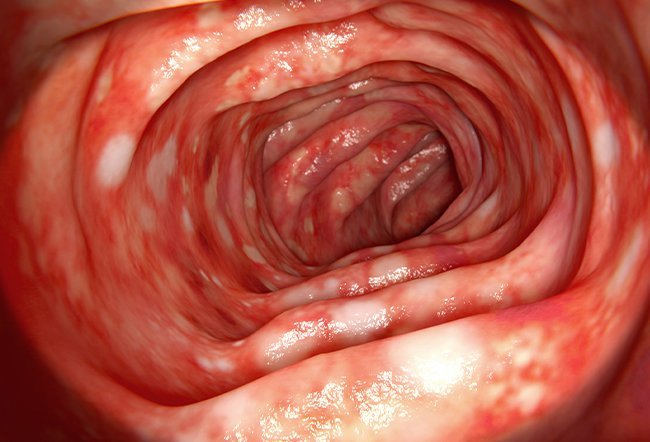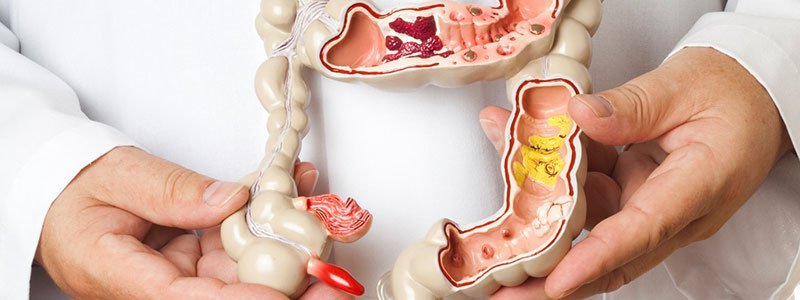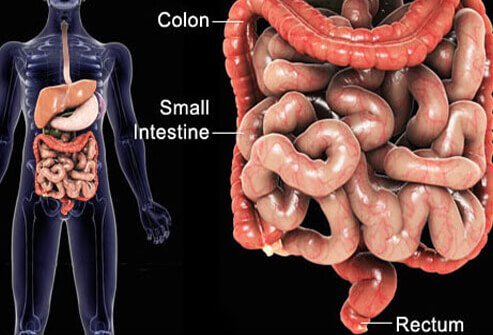
Ulcerative colitis (UC) is a type of inflammatory bowel disease.
Ulcerative colitis is a systemic disease that mainly manifests as intestinal ulcers.
- A multifactorial autoimmune reaction causes inflammation in the intestinal lining and forms ulcers.
- Intestine plays a major role in the absorption of water and salts from the waste food that moves through it.
- Any disruption in the integrity of the intestinal lining causes reduced absorption of water by the intestines, and water is lost through stools causing watery diarrhea.
The ulcers may result in bleeding and cause bloody stools. Excessive bleeding can lead to anemia.
What is ulcerative colitis?
Ulcerative colitis (UC) is a type of inflammatory bowel disease. It is a chronic inflammatory disease of the large intestine (colon and rectum), which usually originates in the rectum and spreads continuously up the colon.
The cause of ulcerative colitis is unknown, but research suggests that combinations of environmental factors, gut flora, immunological dysfunction, and genetic predisposition contribute to ulcerative colitis. Those who have a family member with the illness are at a higher risk. Ulcerative colitis increases the risk of colorectal cancer.
Because the cause of ulcerative colitis is uncertain, no one can predict how the disease will impact the body once it has been diagnosed. Many spend years without experiencing any symptoms, whereas others experience more regular flare-ups. There are various treatments available to help alleviate symptoms and promote remission. However, there is no cure for ulcerative colitis.
There is a significant increase in the number of ulcerative colitis cases in the past few decades. The Centers for Disease and Prevention suggest that the new cases of ulcerative colitis range from 2.2 to 14.3 cases per 1,00,000 individuals.
What are the symptoms of ulcerative colitis?
The symptoms of ulcerative colitis can range from mild to severe, varying among individuals, and the symptoms tend to come and go (flare-ups). They include:
5 risk factors of ulcerative colitis
- Hereditary predisposition: Researchers have revealed that ulcerative colitis is inherited. If a person’s parents or siblings have ulcerative colitis, their chances of developing ulcerative colitis increase by 1 to 28 percent.
- Age: Ulcerative colitis can develop at any age although it is more common in young children and individuals mid-30s to 50 years old.
- Sex: Men who are in their 50s and 60s are more likely to be diagnosed with ulcerative colitis than women.
- Ethnicity: Though all ethnic groups can develop ulcerative colitis, it is more common among Caucasians.
- Environmental factors: Diet, smoking, lifestyle, pollutants, and others may impact the onset, progression, and relapse of the condition.

QUESTION
Ulcerative colitis affects the colon. The colon is also referred to as the… See Answer
3 types of ulcerative colitis
The symptoms of ulcerative colitis vary depending on the level of inflammation and where the illness is in the large intestine.
- Ulcerative proctitis: Ulcerative proctitis is inflammation of the bowel, which is limited to the rectum. There is no increased risk of developing colorectal cancer.
- The symptoms include:
- Left-sided colitis: The inflammation starts in the rectum and spreads to the splenic flexure (a bend in the colon near the spleen in the upper left abdomen). Proctosigmoiditis is a type of left-sided colitis.
- The symptoms include:
- Extensive colitis: The entire colon is affected, the inflammation begins at the rectum and extends beyond the splenic flexure.
- The symptoms include:
How is ulcerative colitis diagnosed?
Medical history is extensively analyzed and physical examination is performed. The symptoms of ulcerative colitis are consistent with various conditions, so a diagnosis is made after various medical examinations to rule out the other possibilities.
- Stool tests: Identify the presence of elevated fecal calprotectin that indicates inflammation.
- Blood tests: Can reveal the presence of possible inflammation, abnormal antibodies, anemia, or nutritional or vitamin deficits.
- Sigmoidoscopy: This procedure is done is examine the rectum and the bottom portion of the colon using a sigmoidoscope.
- Colonoscopy: This procedure is done to examine the whole colon and the end of the small intestine using a colonoscope.
Latest Digestion News
Daily Health News
Trending on MedicineNet
What are the treatment options for ulcerative colitis?
The primary goals of the treatment for ulcerative colitis are to achieve remission and maintain remission to prevent further flare-ups. If remission cannot be achieved, the next objective is to reduce the severity of the condition and frequency of flare-ups to enhance one’s quality of life.
The principle of the treatment of ulcerative colitis is to reduce the inflammation and allow recovery of the lining of the colon and rectum. It helps with diarrhea, rectal bleeding, and stomach discomfort.
However, there is no one-size-fits-all therapy for ulcerative colitis. Because the condition is unique for everyone, the solution must be personalized.
Medical treatment
Various medications that are administered orally, intravenously, or as suppositories or topical agents are available for the treatment of ulcerative colitis. These medications include:
- Amino salicylates
- Corticosteroids
- Immunomodulators
- Biological therapies
- Janus kinase inhibitors
Symptomatic treatment for diarrhea, abdominal pain, nausea, and others is administered to relieve the symptoms.
Surgery
A person may respond well initially to medical treatments. However, severe bleeding from ulcers or rupture of the bowel, or the development of toxic megacolon (a life-threatening complication of severe infection) may indicate surgery.
Surgical excision and total removal of the affected section of the intestine are done. This surgery is called proctocolectomy.
Diet changes
Modifying the diet may be beneficial at times, especially during a flare. The doctor may suggest certain diets at various times, such as:
- Low-salt diet: Minimizes water retention during corticosteroid medication.
- Low-fiber diet: Avoids promoting bowel movements.
- Lactose-free diet: For people with lactose intolerance.
- High-calorie diet: For people who are losing weight or growing slowly.
- Alternative diets: Many additional diet programs have been explored or recommended for inflammatory bowel diseases treatment.
- Gluten-free diets
- Low fermentable oligosaccharides, disaccharides, monosaccharides, and polyols (FODMAP) diet
- Specific carbohydrate diet
- Mediterranean diet
To avoid a nutritional deficit, most doctors recommend a well-balanced diet. A balanced diet should include foods from all dietary categories.
- Protein sources include meat, fish, poultry, and dairy products (if allowed)
- Carbs include bread, cereal, starch, fruits, and vegetables (if tolerated)
- Fat sources include margarine and oils
Correcting nutritional deficiencies with vitamin and nutritional supplements may assist an individual.
What is the difference between ulcerative colitis and Crohn’s disease?
Ulcerative colitis and Crohn’s disease are different types of inflammatory bowel diseases. Though both disorders have similar symptoms, the affected regions of the body are different.
Crohn’s disease can affect any section of the gastrointestinal tract, whereas ulcerative colitis only affects the colon and rectum. Crohn’s disease can damage the full thickness of the intestinal wall, whereas ulcerative colitis only affects the colon’s innermost lining (mucosa or submucosa).
With Crohn’s disease, intestinal inflammation is not continuous, and there are normal sections in the affected gut. This is not seen with ulcerative colitis. Only 10 percent of patients have overlapped characteristics of ulcerative colitis and Crohn’s disease, and this condition is called indeterminate colitis.

SLIDESHOW
Inflammatory Bowel Disease (IBD) Causes, Symptoms, Treatment See Slideshow
Medically Reviewed on 6/3/2022
References
Cleveland Clinic. Ulcerative Colitis. https://my.clevelandclinic.org/health/diseases/10351-ulcerative-colitis
WebMD. Ulcerative Colitis (UC). https://www.webmd.com/ibd-crohns-disease/ulcerative-colitis/what-is-ulcerative-colitis
National Institutes of Health. Ulcerative Colitis. https://www.niddk.nih.gov/health-information/digestive-diseases/ulcerative-colitis